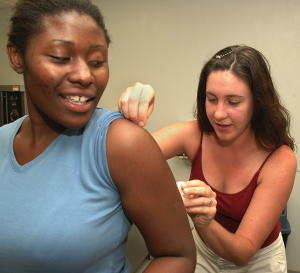by Julie McMillian | Apr 16, 2020
Can I go outside during the Coronavirus Pandemic? Is it a smart idea? As we are instructed by the CDC to isolate ourselves and embrace social distancing, we may start to feel a little restless or stir crazy after staying inside for a long period of time. Spring weather is great, especially in the mornings and evenings, here in Florida. Normally we would be entering a time when people are the most active outdoors. This year we must be a little more creative when deciding what we can do to enjoy daily activities outside of our home.

Family playing outside
Photo Source: UF/IFAS
Children usually need no encouragement to go outside. Youth that spend more time outside have positive outcomes with their health by interacting with their natural environments. They are curious about the world around them and their experiences outside will benefit them in regard to a positive attitude toward their environment. Adults have those same benefits but tend to forget or not have time in everyday life as it gets busy.
Therefore, the question is, what can we do that will keep us at a distance and be educational and productive? If you live in less populated areas, you might plant a garden, build an outside project that you have been putting off, enjoy a picnic, or hike and sight-see through the woods. If in the city and able, go for a walk or jog with your dog, take a bike ride or do some yoga especially if you are missing the gym. Your medical professionals will be glad you are participating in some physical activity and breathing in some fresh air. You might want to get in a lawn chair and just relax and soak up some vitamin D from a few minutes in the sun.
If you have recently become your child’s teacher, you can have learning activities outside. Science and math can be integrated by building a house out of natural resources, allowing students to collect materials and build while fostering creativity. Talk about ecosystems of trees and plants and how they might provide a home for insects or animals. Students could take a piece of paper outside and define what they see in their yard, integrating spelling and vocabulary, or write a short story based on what they hear and observe.
We are living and facing challenges today that we probably have not encountered before, so it is a good time to find an outlet to relieve stress and detour the onset of depression. The web is full of ideas for all ages if you run out of inspiration and some days we do. Remember to keep a safe distance from others, wash your hands frequently and follow your local guidelines but don’t be afraid to try something new that may be out of your ordinary routine. It might turn out to be your favorite hobby.
For more information on healthy living or other extension related topics, contact your local UF IFAS county extension office.
Supporting information for this article can be found in the UF/IFAS Extension EDIS publications:
Kids in the Woods
Why is Exposure to Nature Important in Early Childhood
COVID-19 Preventative Measures
UF/IFAS Extension is an Equal Opportunity Institution.

by Laurie Osgood | Mar 3, 2020
Friendships are an important part of life, and friendships can have a tremendous impact on our personal well-being and overall mental and physical health. Social isolation can lead to depression and loneliness. The relationships that we build with our family and friends can affect the quality of the friendships that we develop over our lifetimes. Some people thrive socially and develop deep, meaningful connections with others, while others only maintain distant friendships. However, it is important for us to help our children learn to develop these important social skills. Researchers have long documented links between the quality of relationships between family members and their relationships with their peers. Participation in team sports can have lasting benefits, including responsible social behaviors, good sportsmanship, strong leadership skills, academic success, and self-confidence.

Parents can form lasting friendships while supporting their kids in youth sports. (Photo source: Laurie Osgood, UF/IFAS Extension)
When It Comes to Youth Sports, Parents Don’t Always Behave Themselves.
As team sports become more competitive, there is increased attention placed on the negative aspects of team sports, mainly parental expectations and behavior. Having spent a large part of my life sitting in the stands watching my children play team sports, I have developed deep, long-lasting friendships with the parents of my children’s friends. These friendships are often maintained between parents long after our children put away their soccer cleats. Of course, overbearing parents can take the fun out of sports for our children. Many children drop out of team sports because they are no longer having fun and participation becomes too stressful.
What Can Parents Do to Help Their Kids Develop Positive, Warm Friendships?
- Continue to nurture and support the friendships that you have established throughout your lifetime.
- Be a good sports parent by showing support to your child.
- Model good friendship skills. This will help youth understand social competence.
- Be happy and have fun at your child’s competitions.
- Minimize pressure & don’t coach your child from the sidelines.
- Nurture the youth’s ambitions, but don’t let them get too wrapped up in the competitiveness.
- Be respectful of your child’s teammates, coach, opponents, and the game’s rules and traditions.
It is our job as parents to teach our children social skills to help them grow as individuals, not just athletes. As parents it is our job to nurture their emotional and physical development. Even as adults we must continue to stay connected with our friends and families. As we grow older, good friendships can prevent loneliness, improve our health, boost our well-being, and even add years to our lives.

by Melanie Taylor | Jan 9, 2020

One of the best ways to help prevent the flu this season is to get vaccinated. Even if you still get the flu, the severity and length of illness may be diminished. (Photo source: UF/IFAS file photo)
The holiday season has passed and now we are well on our way into 2020 with a very severe flu season. You are the best person at making sure you do not get the flu. Here are a few tips that you should consider as this flu season continues and still has not reached its peak.
- GET VACCINATED. It takes, on average, two weeks for the flu vaccine to reach its full potential, so if you have not gotten the flu shot, get it NOW. Even if you still get the flu, it will likely be shortened in time and strength if you are vaccinated.
- WASH YOUR HANDS. Washing your hands frequently will help protect you from the flu. If soap and water are not available, use an alcohol-based hand sanitizer.
- AVOID CLOSE CONTACT WITH PEOPLE WHO ARE SICK. Be sure to avoid direct contact with anyone that is sick. If you must come in contact with them be sure to wash your hands once you leave. If you are sick, keep your distance from others to protect them from getting sick too.
- AVOID TOUCHING YOUR FACE. Germs are spread quickly when a person touches something that is contaminated with germs and then touches his or her eyes, nose, or mouth. So make a conscious effort to keep your hands away from your face.
- COVER YOUR MOUTH AND NOSE WHEN YOU COUGH AND SNEEZE. Cover your mouth and nose with a tissue when coughing or sneezing, or sneeze/cough into your closed elbow. These steps may prevent those around you from getting sick.
- STAY HOME WHEN YOU ARE SICK. If possible, stay home from work and school when you are sick. This is the best way to avoid spreading your germs to other people. The CDC (Centers for Disease Control and Prevention) recommends you stay home for at least 24 hours after your fever is gone except to get medical care or for other necessities. They also recommend that your fever should be gone for 24 hours (without the use of a fever-reducing medicine) for you to no longer be considered contagious.
- PRACTICE GENERAL GOOD HEALTH HABITS. Clean and disinfect frequently touched surfaces at home, work, and school, especially when someone is sick. Wash backpacks, coats, and other items regularly. Get plenty of sleep, be physically active, manage your stress, drink plenty of fluids, and eat nutritious food.
Follow the tips above and maintain the best health practices possible and hopefully you will be one of the lucky people that avoids the dreaded flu this year. Wishing you all a healthy and happy 2020!
Source: https://www.cdc.gov/flu/prevent/prevention.htm

by Stephanie Herzog | Oct 11, 2019
Have you ever been bullied or know someone who has been bullied? I know I have. October is National Bullying Prevention Month. Each October since 2006, there has been a national effort to raise awareness about bullying and provide education and resources to try to prevent it. According to data from 2017, about 20% of youth ages 12-18 experienced bullying at school and nearly 30% reported cyberbullying during their lifetime. That is a lot of our country’s youth!
What Exactly is Bullying?
Bullying is unwanted aggressive behavior. Bullying must have a real or perceived power imbalance between the bully and the victim, where the bully uses their power to control or hurt their victim. The bullying behavior needs to be repeated over time, or at least have the potential to repeat over time.
There are three categories of bullying:
- Verbal bullying includes teasing, taunting, threats, or name-calling
- Social or relational bullying includes ignoring someone on purpose, ostracizing, spreading rumors, or embarrassing someone
- Physical bullying includes damaging belongings or harming another’s body such as spitting, hitting, pushing, rude gestures, or tripping

The constant and easy access of cell phones, social media, and the internet has increased the real dangers of cyberbullying. (Photo source: UF/IFAS)
Cyberbullying
Technology has changed the ways of bullying. Bullying is no longer only ‘picking on’ someone, making fun of them, calling them names, or ignoring them at school. The constant and easy access of cell phones, social media, and the internet has truly expanded bullying to an unthinkable, unending scale. There are many ways to bully someone online, including:
- Verbal attacks, mean messages, or rumors on social media accounts, online games such as Fortnite, or through email or text
- Releasing embarrassing or inappropriate pictures, GIFs, or videos online or through text (e.g. sexting)
- Creating fake profiles or hacking into someone’s account online in order to hurt that person
Perhaps one of the most dangerous things about cyberbullying is once something is posted online and is circulated, it’s very hard to permanently remove. This oftentimes makes escape from the bullying unusually difficult or even seemingly impossible. It’s so important to keep up with ways technology is advancing in order to protect ourselves from things like cyberbullying.
Effects of Bullying
The negative psychological effects of bullying are very real – for the bully, the victim, and those who may witness it.
For the bully, they have a greater risk of using substances, engaging in risky or violent behavior, being abusive in future relationships, committing crimes, and developing other external behavior problems.
Effects of bullying include low self-esteem, fear, loneliness, heartache, and potential physical illness. These effects put a widespread toll on the mental, physical, and social health of the victims and also those who witness bullying. The increased risk of using addictive and illegal substances, anxiety, depression, eating disorders or even becoming suicidal are to be taken seriously and should be treated appropriately. Seek out mental health professionals or physicians and consult with them on the best combination of treatment. These effects can last days, months, years, or even lifetimes depending on the person and the circumstance.
The Story of Amanda Todd
The story of Amanda Todd is an unfortunate real example of cyberbullying and how unforgiving and never-ending it can be. Amanda ultimately committed suicide to get away from it; she was only 15 years old. Her YouTube video, published in 2012 a month before she committed suicide, has 13.5 million views to date. To better understand the reality of bullying, please consider watching it or sharing it. However, viewer discretion is advised.
Bullying, harassment, discrimination, or any other type of negative, cruel, or harmful behavior is never okay or acceptable in any way. If you have been a witness of bullying or a bully, stand up to stop it! If you have been bullied or know someone who has, please seek help from caring professionals, family, or friends. Go-to resources are found below.
Additional Resources
Stop Bullying Now Hotline: 1-800-273-8255
- Available 24/7, managed by the U.S. Department of Health and Human Services
National Suicide Prevention Lifeline: 1-800-273-8255
- Available 24/7, there is an online chat option available here
The Trevor Project: 1-866-488-7386
- Available 24/7, suicide prevention help specifically for the LGBTQ+ community
- Texting and chat options are available here
National Eating Disorders Association: 1-800-931-2237
- Mon-Thu 9am-9pm, Fri 9am-5pm
The Cybersmile Foundation
STOMP Out Bullying
Stopbullying.gov
Sources
National Center for Educational Statistics, Indicators of School Crime and Safety Indicator 10: Bullying at School and Electronic Bullying, April 2019.
Cyberbullying Research Center
The Amanda Todd Legacy

by Angela Hinkle | Sep 3, 2019
Hurricane season is June 1 to November 30, with peak season in September and October. And hurricanes are not the only disasters we have to contend with. Living Well in the Panhandle provides the trusted Disaster Resources you need so you know what to do to keep your family and you living well.
Disaster Resources
Below are helpful resources for preparing for and handling the aftermath of a disaster. For more information, please contact your local UF/IFAS Extension Office.
Food Safety
Is My Food Safe to Eat?
Keeping Your Food Safe During Emergencies: Power Outages, Floods, and Fires
USDA – A Consumer’s Guide to Food Safety-Severe Storms and Hurricanes Guide
Well Water Safety
Well Water Testing
Housing
Search for an open emergency shelter near you by texting SHELTER and your zip code to 4FEMA (43362) Example: SHELTER 01234

Lightning storm. Photo Source: UF/IFAS
Cleaning Up After a Hurricane
Safety Comes First!
Get the Right Tree Care Professional
Hiring an Arborist – Spanish
Cleaning Mold After a Flood
Hurricanes and Mosquitoes
Mosquito Control Tips for Homeowners
Money Management/Consumer Issues
Avoiding Fraud and Deception
Six Steps in Making an Insurance Claim
Replacing Lost or Damaged Documents
FEMA – Individual Disaster Assistance
FEMA – Interim Housing Resources
USDA Farm Service Agency Disaster Assistance
Disaster Recovery Loans
Tax Relief After a Disaster
Complaints – If you have a complaint about disaster relief assistance, contact the Department of Homeland Security’s Inspector General’s Office at 1-800-323-8603.
Family Health and Wellness
Call the Disaster Distress Helpline 24/7 for free counseling – 1-800-985-5990 (TTY) 1-800-846-8517
OR text TalkWithUs to 66746
Mental Health for Adults
Mental Health for Kids
Mental Health for Adolescents
Agriculture and Natural Resources
Practices to Minimize Flooding Damage to Commercial Vegetable Production
Florida Panhandle Agriculture
Florida Panhandle Agriculture Facebook

by Heidi Copeland | Apr 30, 2019

The Consumer Financial Protection Bureau, (CFPB) has defined financial capacity as a the combination of attitude, knowledge, skills, and self-efficacy needed to make and exercise money management decisions that best fit the circumstances of one’s life, within an enabling environment that includes, but is not limited to, access to appropriate financial services.
Many of the attitudes, knowledge and skills needed to build financial capacity can be learned. People learn behavior through a variety of contexts. Children, in particular, learn through practices modeled by a parent or caregiver. In fact, research shows that parents and caregivers have the most influence on their children’s financial capability.
If you are like most parents, you probably recognize this—and you are interested in setting your kids on a good path toward financial well-being. However, many parents also say they do not always have time, tools, or personal confidence to start talking about money thinking their children will learn about it in school, later on, when they are old enough to understand.
This is most unfortunate. According to the Council for Economic Education 2018 Survey of the States, only 17 States require high school students to take a course in personal finance. So, if a parent isn’t teaching their children basic money/financial skills who is? Economical and financial literacy is a foundational element to achieving financial health and financial well-being. It is never too early (or too late) to start building this.
Talking to children about money, even in EARLY CHILDHOOD, helps children build the skills they need later in life. Early childhood education experts like to call this scaffolding. You are setting the framework…the support…the platform, encouraging financial capability milestones from early childhood into young adulthood. Children can learn the behaviors, knowledge, skills, and personal characteristics that support financial health and well-being.
Books can help start these critical early conversation. The CFPB has made it EASY! Parents can be their child’s first financial capability teacher! The University of Wisconsin-Extension Family Living Programs and the University of Wisconsin-Madison Center for Financial Security have selected books for the CFPB Money as you Grow Book Club. This program uses easy to read and understand children’s books to discuss money concepts. These books include many favorites:
- A Bargain for Frances, by Russell Hoban
- A Chair for My Mother, by Vera Williams
- Alexander, Who Used to Be Rich Last Sunday, by Judith Viorst
- Count on Pablo, by Barbara deRubertis
- Cuenta con Pablo, by Barbara deRubertis
- Curious George Saves His Pennies, by Margaret and H.AS. Rey
- Just Shopping With Mom, by Mercer Mayer
- Lemonade in Winter, by Emily Jenkins
- My Rows and Piles of Coins, by Tololwa M. Mollel
- Ox-Cart Man, by Donald Hall
- Sheep in a Shop, by Nancy Shaw
- The Berenstain Bears & Mama’s New Job, by Stan & Jan Berenstain
- The Berenstain Bears’ Trouble With Money by Stan and Jan Berenstain
- The Purse, by Kathy Caple
- The Rag Coat, by Lauren Mills
- Those Shoes, by Maribeth Boelts
- Tia Isa Wants a Car, by Meg Medina
- Tia Isa Quiere un Carro, by Meg Medina
Fortunately, many of the building blocks for good financial decision making – like self-regulation, patience, planning, and problem-solving – do not require a lot of financial know-how.
Reading books with children is a creative way to learn about the many sides of money management. Pick up a few of the titles at your local library and influence your children’s financial capability. Building good habits leads to a life of good financial health and well-being.
Example of key ideas from reading books:
| PLANNING |
How Children Show It |
| Making Decisions |
Can look at a few choices and select on what will bring the best results. |
| Setting Goals |
Can follow a multi–step plan. |
| Prioritizing |
Can prioritize choices when they want two or more things at once. |
| Solving problems
|
Can describe problems and come up with a few idea to make things better. |
| MONEY |
|
| Earning |
Can identify the different jobs people in the family and in the community do to earn money and keep it safe. |
| Spending |
Make spending choices with their own money – real or play. |
| Saving |
Keeps money in a safe place and keeps track of amount saved for future spending. |
| Sharing and borrowing |
Can explain the difference between lending and giving something away. |
| ME |
|
| Self-control |
Can talk about times when they were able to wait and how they were able to do it. |
| Follow-through |
Can identify who they can turn to for help reaching a goal, or what tools or tricks might help them stick with a plan. |
| Staying true to yourself |
Name one special thing they like about themselves and their loved ones. |
| Flexibility |
Can talk about a time when their plans did not turn out how they wanted and what they did instead. |
Resource: https://www.consumerfinance.gov/consumer-tools/money-as-you-grow/











